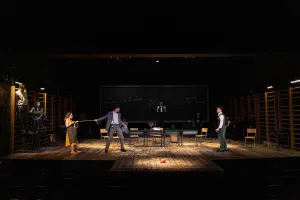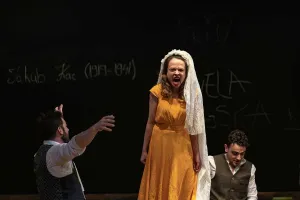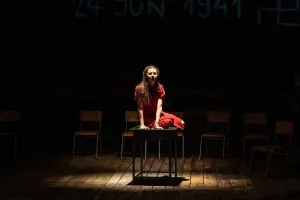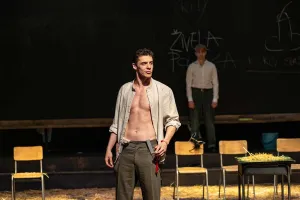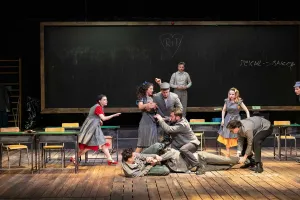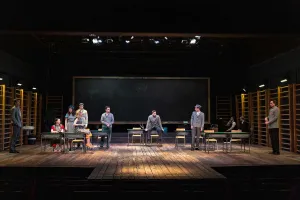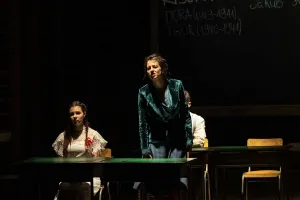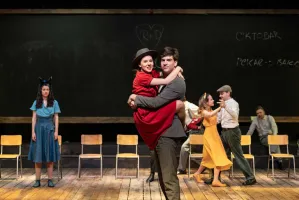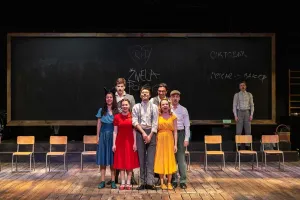Our class
drama by Tadeusz Słobodzianek
Repertoire
„Raša Plaović” stage, 20 January 2026, 20:30
Podela:
Zoha MIONA MARKOVIĆ
Rahelka/Marijana SUZANA LUKIĆ
Dora JELENA BLAGOJEVIĆ
Rišek VUČIĆ PEROVIĆ
Vladek NEDIM NEZIROVIĆ
Zigmunt PETAR STRUGAR
Henjek DANILO LONČAREVIĆ
Jakub Kac DRAGAN SEKULIĆ
Abram DUŠAN MATEJIĆ
Menahem JOVAN JOVANOVIĆ
Muzičari:
klarinet VLADIMIR GURBAJ
violina NIKOLA DRAGOVIĆ
harmonika, klavir IVAN MIRKOVIĆ
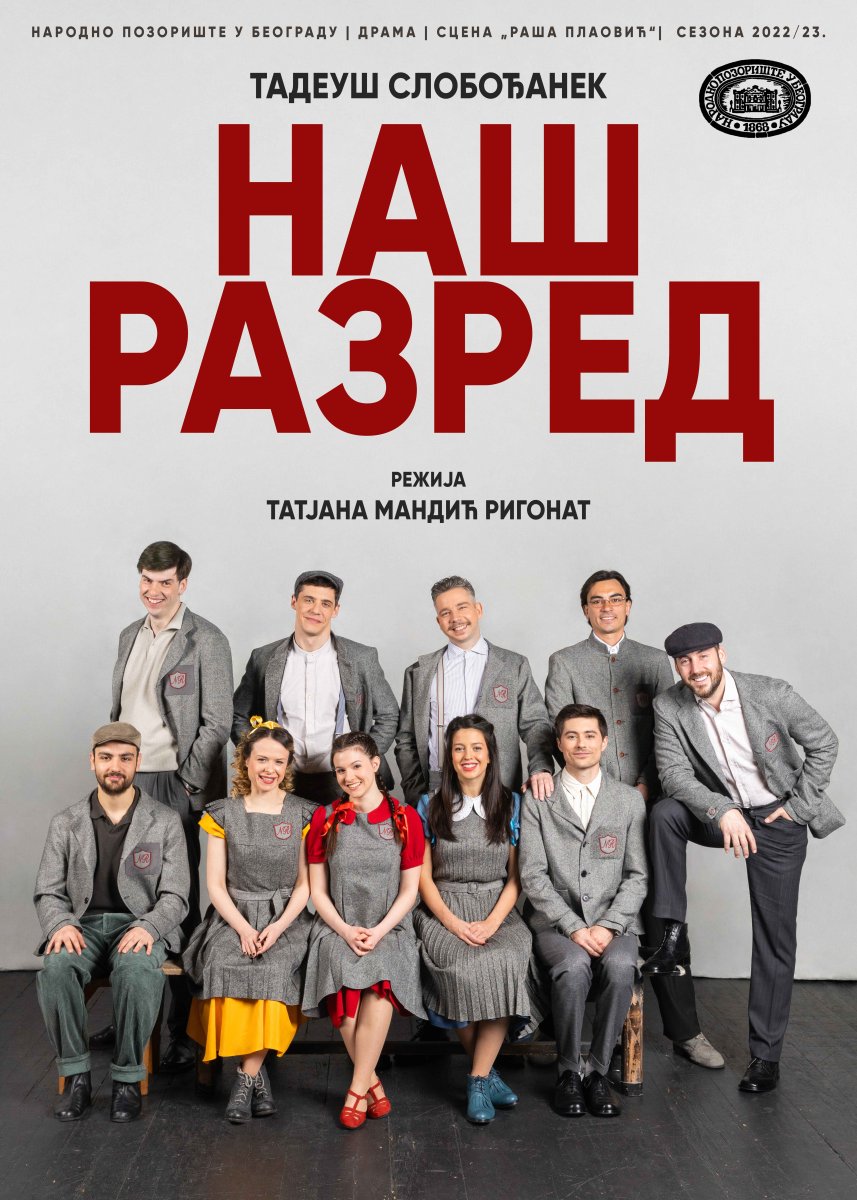
ABOUT THE PLAYWRIGHT
Tadeusz Słobodzianek, a Polish playwright, theatre critic, theatre director, author of the play "Our Class. History in 14 Lessons" was born in 1955 in Yeniseysk, Siberia, where his parents were exiled in 1944. They returned to Poland in 1955 and settled in Bialystok. His mother was from an Orthodox family, and his father was a Catholic of Polish-Ukrainian origin. Tadeusz studied theatre studies at the Jagiellonian University in Krakow. After completing his studies, he wrote and published theatre reviews for some time under the pseudonym Jan Koniecpolski. He made his debut in 1981 as the author of the children's play "Autumn Tale". From the early 1980s, he has started working as a dramaturge in theatres: in Kalisz, Poznań, Lodz, Gdańsk. He is one of the founders of the experimental Wierszalin Society, which grew into the avant-garde Wierszalin Theatre. From 1984 to 1989 he worked in the puppet theatre in Bialystok, and since 1994 in the Warsaw Drama Theatre.
The play "Our Class" has been in the repertoire of the world's most prestigious theatres for years and the most prominent theatre theoreticians and theatre critics have been writing about it. It was written in 2008 and premiered in English at the Royal Theatre in London. The director of the play, Bijan Sheibani, received the Sir Laurence Olivier Award. In Poland, the play was performed in 2010 at the Warsaw theatre - Tadeusz Łomnicki Theatre in Wola [Stage Wola named after Tadeusz Łomnicki] directed by Ondrej Spišák. The text of the play was awarded with the most significant Polish literary prize "Nike". It has been performed in theatres in England, USA, Canada, Japan, Brazil, Spain, Italy, Hungary, Sweden, Czech Republic, Israel, Lithuania...
His other plays have also premiered on stage: "Car Mikołaj / Tsar Nikolai", "Trap", " Citizen Pekosiewicz", "Prophet Ilya", "Young Stalin", "The Story of Jacob”, "Wojtek the Bear", "The Fatalist", "Merlin – The Secret History", "The Blacksmith Malambo", "Citizen Pekos", "Bedbug’s Dream, or Comrade Christ", "Cabaret for the End of the World", "The Prophet's Death and Other Stories about the End of the World"... His plays are directed by the most prominent Polish and international directors: Kazimierz Dejmek, Maciej Prus, Mikolaj Grabowski, Piotr Tomaszuk, Ondrej Spišák, Hisao Takase, Derek Goldman, Natalie Ringler, Hanan Snir, Oskaras Koršunovas and others.
Tadeusz Słobodzianek received the following accolades: Minister of Culture and Arts Award, Literary Fund Award for the play "Tsar Nikolai", Grand Prix for the play “Prophet Ilya”, "Polityka" Passport for his overall dramatic work and contribution to the work of the avant-garde Wierszalin Theatre, Ministry of Culture and Arts Award for the play "Bedbug’s Dream, or Comrade Christ", the Warsaw Ghetto Uprising Medal awarded by the Association of Jewish Fighters and Victims of World War II and a number of others.
ABOUT THE PLAY
Of all Słobodzianek’s plays, the play "Our Class. History in 14 Lessons" is the most successful one. It is considered to be thematically inspired by the "Jedwabno Case". In 1941 in Jedwabno, a town in the northeast of Poland, the Poles burned 1,600 Jews alive in a barn, about which Jan Tomasz Gross wrote the book "Neighbours". Some time later, journalist Anna Bikont wrote a book entitled "We from Jedwabno". And after them, Tadeusz Słobodzianek wrote the play "Our class. History in 14 Lessons".
To this day, the question remains: What happened to "our class"? Because, apart from the Jedwabno case, "the play" goes beyond the framework of a specific historical situation in the broadest sense of the word. It becomes universal. (...) Theatre critics Krystyna Duniec and Joanna Krakowska wrote a very significant text entitled "What Is Happening with Our Class" in the Polish magazine "Dialog (Dialogue)" (2010/1) about the inevitable differences in the reception of "Our Class" in Western and Eastern Europe and on other continents, about the differences that prevent the universal understanding of history, emphasising that Słobodzianek’s work is artistic, not journalistic.
There is also a very important text written by the critic Joanna Szczesna titled "That's Our Class" published in "Gazeta Wyborcza" (2010/224): "It is not a story about a specific crime, but about the tragedy and absurdity of human existence entangled in history." Ordinary people, neither good nor bad, collided with something that was larger than them. Despite their efforts, they did not pass the maturity test and they will never recover from that failure... Słobodzianek’s Our Class will transfer the issue of crime and punishment, guilt and judgment, suffering and forgiveness from history and the stage directly into our lives." And many Western directors have expressed similar beliefs about the universal message of Our Class. (…) Because Słobodzianek wrote a play about Jedwabno but at the same time about the general mechanisms of hatred and aggression in a multi-ethnic society, about ethnic conflicts in many countries of the world, which in certain moments universally lead to tragedy.
(Extracts from the text written by Biserka Rajčić)

